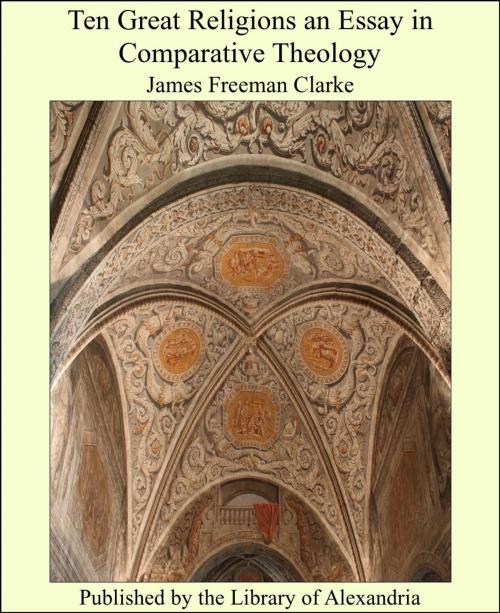Ten Great Religions an Essay in Comparative Theology
Nonfiction, Religion & Spirituality, New Age, History, Fiction & Literature| Author: | James Freeman Clarke | ISBN: | 9781613102015 |
| Publisher: | Library of Alexandria | Publication: | March 8, 2015 |
| Imprint: | Language: | English |
| Author: | James Freeman Clarke |
| ISBN: | 9781613102015 |
| Publisher: | Library of Alexandria |
| Publication: | March 8, 2015 |
| Imprint: | |
| Language: | English |
Ethnic and Catholic Religions. § 1. Object of the present Work. The present work is what the Germans call a _Versuch_, and the English an Essay, or attempt. It is an attempt to compare the great religions of the world with each Other. When completed, this comparison ought to show what each is, what it contains, wherein it resembles the Others, wherein it differs from the Others; its origin and development, its place in universal history; its positive and negative qualities, its truths and errors, and its influence, past, present, or future, on the welfare of mankind. For everything becomes more clear by comparison We can never understand the nature of a phenomenon when we contemplate it by itself, as well as when we look at it in its relations to Other phenomena of the same kind. The qualities of each become more clear in contrast with those of the Others. By comparing together, therefore, the religions of mankind, to see wherein they agree and wherein they differ, we are able to perceive with greater accuracy what each is. The first problem in Comparative Theology is therefore analytical, being to distinguish each religion from the rest. We compare them to see wherein they agree and wherein they differ. But the next problem in Comparative Theology is synthetical, and considers the adaptation of each system to every Other, to determine its place, use, and value, in reference to universal or absolute religion. It must, therefore, examine the different religions to find wherein each is complete or defective, true or false; how each may supply the defects of the Other or prepare the way for a better; how each religion acts on the race which receives it, is adapted to that race, and to the region of the earth which it inhabits. In this department, therefore, it connects itself with Comparative Geography, with universal history, and with ethics. Finally, this department of Comparative Theology shows the relation of each partial religion to human civilization, and observes how each religion of the world is a step in the progress of humanity. It shows that both the positive and negative side of a religion make it a preparation for a higher religion, and that the universal religion must root itself in the decaying soil of partial religions. And in this sense Comparative Theology becomes the science of missions. Such a work as this is evidently too great for a single mind. Many students must co-operate, and that through many years, before it can be completed. This volume is intended as a contribution toward that end
Ethnic and Catholic Religions. § 1. Object of the present Work. The present work is what the Germans call a _Versuch_, and the English an Essay, or attempt. It is an attempt to compare the great religions of the world with each Other. When completed, this comparison ought to show what each is, what it contains, wherein it resembles the Others, wherein it differs from the Others; its origin and development, its place in universal history; its positive and negative qualities, its truths and errors, and its influence, past, present, or future, on the welfare of mankind. For everything becomes more clear by comparison We can never understand the nature of a phenomenon when we contemplate it by itself, as well as when we look at it in its relations to Other phenomena of the same kind. The qualities of each become more clear in contrast with those of the Others. By comparing together, therefore, the religions of mankind, to see wherein they agree and wherein they differ, we are able to perceive with greater accuracy what each is. The first problem in Comparative Theology is therefore analytical, being to distinguish each religion from the rest. We compare them to see wherein they agree and wherein they differ. But the next problem in Comparative Theology is synthetical, and considers the adaptation of each system to every Other, to determine its place, use, and value, in reference to universal or absolute religion. It must, therefore, examine the different religions to find wherein each is complete or defective, true or false; how each may supply the defects of the Other or prepare the way for a better; how each religion acts on the race which receives it, is adapted to that race, and to the region of the earth which it inhabits. In this department, therefore, it connects itself with Comparative Geography, with universal history, and with ethics. Finally, this department of Comparative Theology shows the relation of each partial religion to human civilization, and observes how each religion of the world is a step in the progress of humanity. It shows that both the positive and negative side of a religion make it a preparation for a higher religion, and that the universal religion must root itself in the decaying soil of partial religions. And in this sense Comparative Theology becomes the science of missions. Such a work as this is evidently too great for a single mind. Many students must co-operate, and that through many years, before it can be completed. This volume is intended as a contribution toward that end















